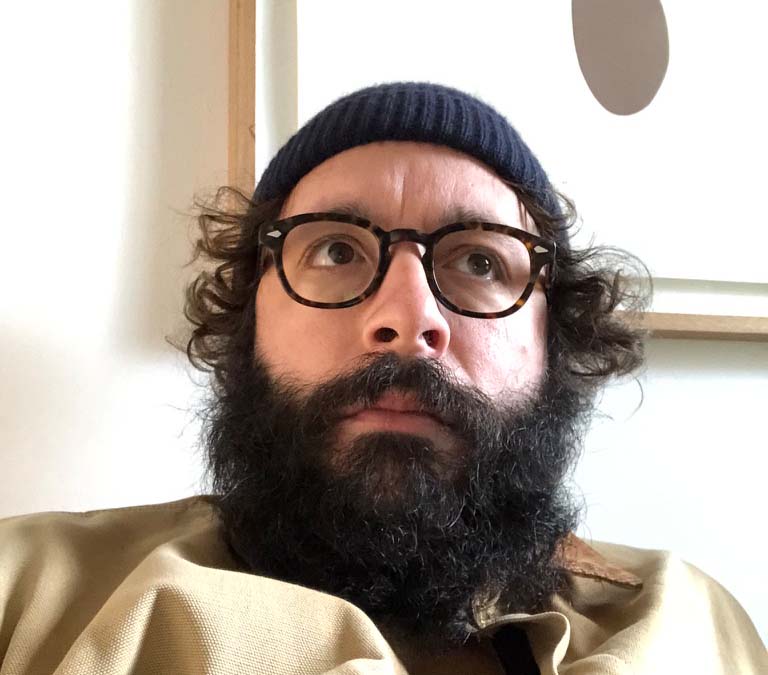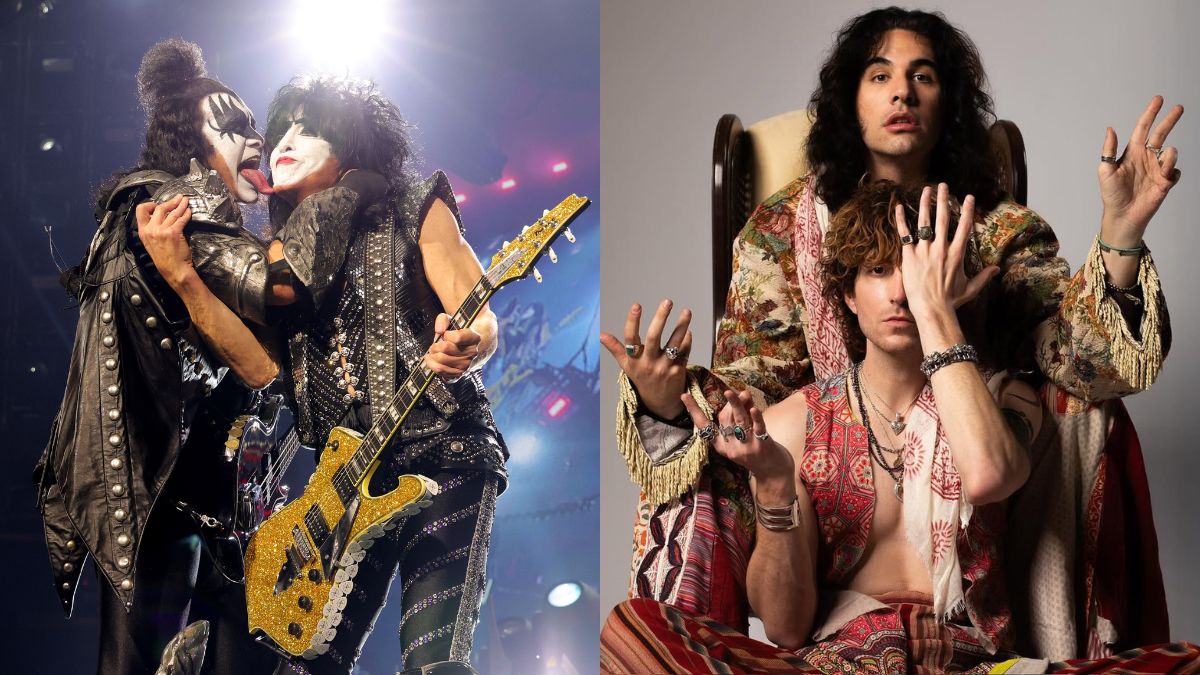Dhani Harrison: “If you've got time and the will to do it, you can make a guitar sound like anything”
The multi-instrumentalist and composer reveals the design choices behind his signature Fender ukulele, and talks Jimi Hendrix, his love of pedals, and responsibility as a guitar protector
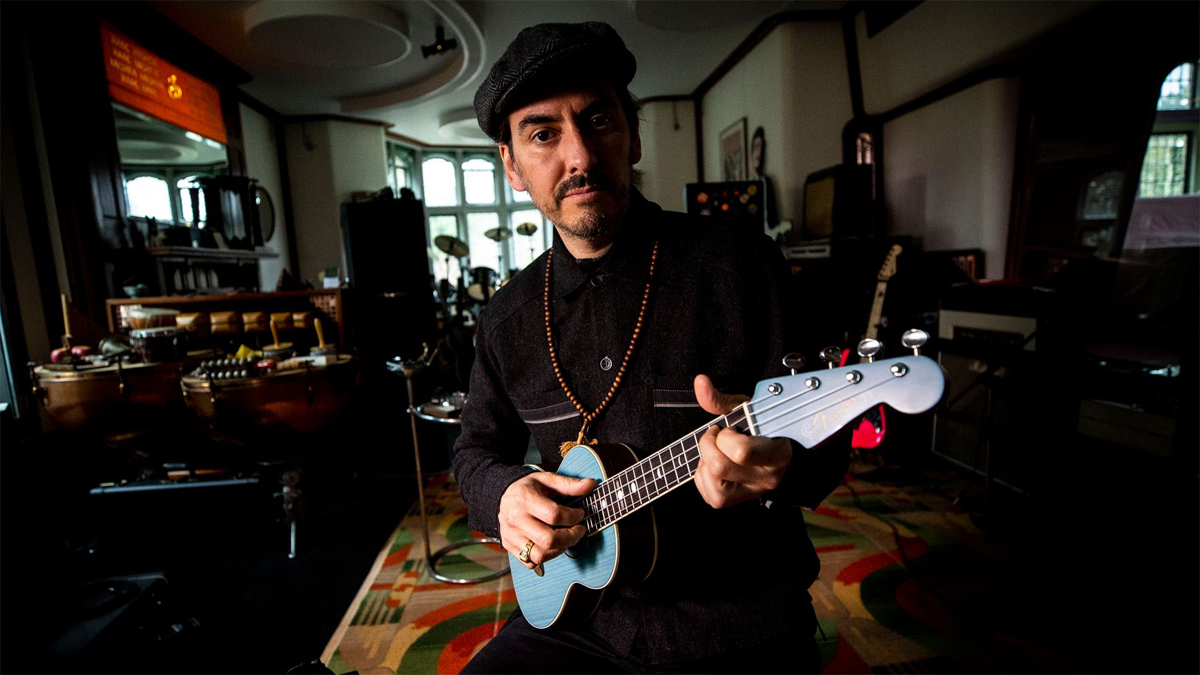
Here at Guitar World, we are accustomed to presiding over acoustic and electric guitars that have been spec’d up to an artist’s preference and sent to market with their name on the headstock.
From a gear point of view, it’s always interesting, perhaps revealing a new way of achieving a certain tone or technique. From an artist point of view, even more so. We can learn a lot about the artist from their choice of instrument.
But in the past few years, the signature ukulele has risen to prominence. The humble uke, which has hitherto enjoyed a lower profile in the pantheon of stringed instruments, is having its time in the sun, with artists such as Billie Eilish working with Fender on their own signature models.
The multi-instrumentalist and composer Dhani Harrison has done likewise, and with the release of his own signature, he joined us to talk about how the ukulele fits into his sound and its role in contemporary music.
Upon the release, Harrison said he wanted the ukulele to bring joy to people. Due to its size, it makes an excellent gateway instrument for small hands. But, as he explains, it is also an instrument for grown-ups. The Fender Dhani Harrison Signature Ukulele is designed for live performance, recording, and sitting nicely in a mix with other instruments.
But while we had Harrison’s ear, it would be remiss not to talk guitar. His father, George, played a bit, and growing up in that environment before embarking on a musical career of many projects had to have left its mark. As Harrison explains, it left a lot of guitars, and the responsibility to take care of them.
Harrison’s career has seen him soundtrack films such as the Richard LaGravenese gothic fantasy Beautiful Creatures and RZA’s Cut Throat City, release the solo album In///Parallel in 2017, and play in both Thenewno2 and Fistful of Mercy.
All the latest guitar news, interviews, lessons, reviews, deals and more, direct to your inbox!
Here, he discusses his influences, the impact of effects pedals on the future of electric guitar and how his writing process has evolved to give his compositions a free hand to find their own purpose, be it in song or in film score.
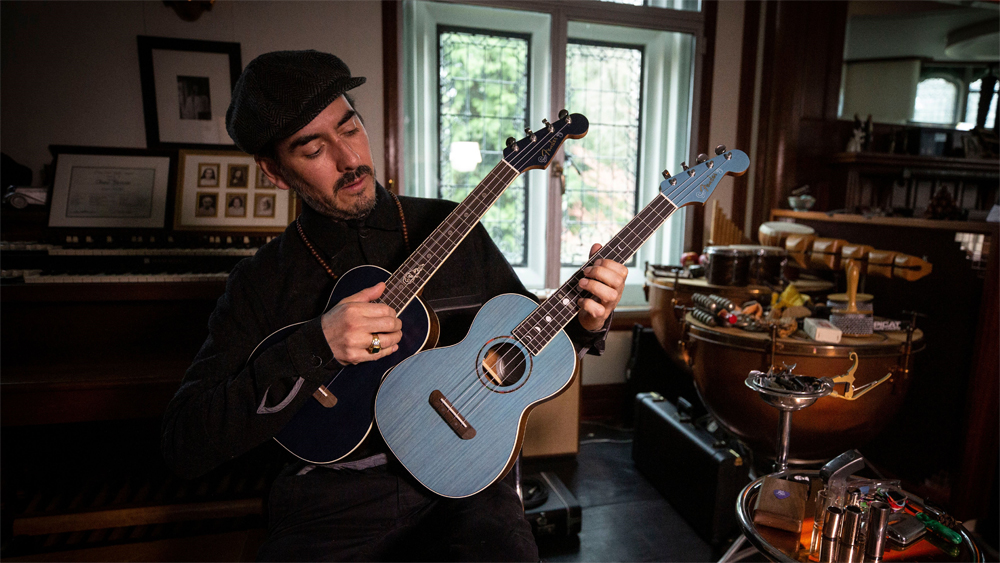
You’ve used solid ovangkol on the top, back and sides, and the uke is a tenor size with a custom body depth. How does that affect the tone?
“The ovangkol was the closest we could get to koa, which is rare, and it’s quite durable. It’s got a nice look to it, too, and it's feasible to mass produce. It’s got a rounded back and I like the size – it's kind of in-between all of the Fender uke sizes. I have a stage uke that’s too thin. It doesn’t have any resonance. And then I have a bigger uke, which is quite thick, but you can't take that on stage because it would just feed back.
“I designed it to be my ideal stage ukulele. But also so that when you take it off the stage and you're not plugged in, it sounds like a good uke. We played around with the size until we got it right. It was like the Goldilocks syndrome... Just right.”
It's available in two finishes; what can you tell us about the inscriptions? And the fretboard inlays are different on both; what's the significance of that?
“I wanted to do blue, and I wanted a light and dark, kind of like a 'blue-sky day' and a 'space-black night'. So the Sapphire Blue Transparent is kind of my nighttime mode and the Turquoise stain is my daytime mode. The Turquoise stain has the cycles of the moon.
I spent a lot time studying astrology and the phases of the moon and how that affects us, so I wanted my uke to reflect that
“I spent a lot time studying astrology and the phases of the moon and how that affects us, so I wanted my uke to reflect that. Also, it was kind of an homage to the old Tom Petty Full Moon Fever Martin custom guitar back in the '90s.
“The symbol etched on the back is the Shiva Yantra, which is like a visual mantra – the Shiva mantra conquers death, so I thought that was quite powerful. And also, when you see the crescent moon, they call it a Shiva moon. So that’s why that one had the moon on it.
“The other one was kind of a different, more of a Tibetan vibe, with the third eye Chakra illustration. It’s quite familiar; you'll see it a lot painted on temples. Those eyes with the om, the om through the third eye.
"Then on the fretboard, I found some really nice Tibetan-style illustrations of clouds, almost like mystical dragon clouds, so that's why that's got a little cloud on the 12th fret. They both have origins in Buddhism, Hinduism, spirituality, and powerful symbols.”
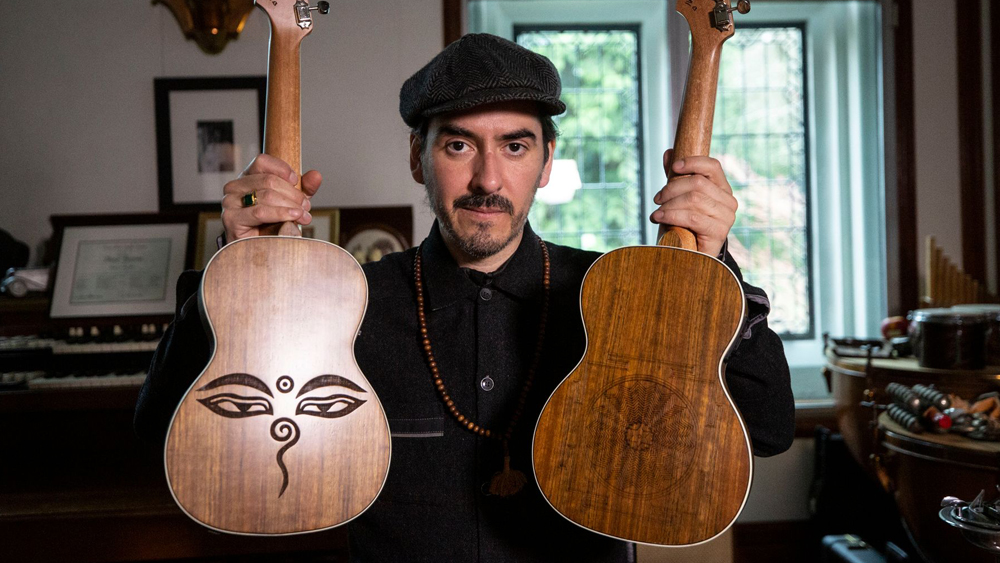
Speaking as a Gen X’r, growing up we tended to associate the ukulele with George Formby, but it has been thoroughly rehabilitated as a quote/unquote "serious instrument" in the past decade or so. What do you put this down to?
“I think I definitely know one man who has been representing, and that’s Eddie Vedder with that cool ukulele album he did for the Into the Wild soundtrack. I think Ed has done some great work making the ukulele cool. Mind you, saying that, look at George Formby's right hand. If Eddie Vedder could do that!
“I think Israel Kamakawiwoʻole with his beautiful voice and that cover of Somewhere Over the Rainbow, which was used in a lot of films, helped, too. He was a real heartbreaker. And then there’s Jake Shimabukuro and that viral video of him doing While My Guitar Gently Weeps.
“So Jake, Israel and brother Eddie. Those are some guys that I vibe with, and they've definitely raised the bar in terms of taking the ukulele from being a novelty back to being a serious heart-wrenching little bit of kit.”
And, related, where do you see its role in an ensemble? When you reach for it, what are you looking for that you can’t get on a guitar?
“Well, a banjolele would fit in with a big band orchestra, like a Paul Whiteman orchestra, or Hoagy Carmichael. It was always banjos, and then sometimes banjolele. So wherever you would have a resonator banjo in an orchestra, or in a big band.
"Wooden ukuleles, though, tend to be more of a solo instrument because they’re not very loud. You can get a ukulele orchestra, but it's quite hard to get them in a band situation.
“They’re more of a solo instrument; they’re more lonely. I would use the ukulele in a percussive manner in some songs, but you have to have a good pickup, and this goes back to why I made the choices about size and the pickup and the EQ on my signature uke. Otherwise it just doesn't come through.”
Indeed, did you have any discussions with Fender about a signature guitar or was it always going to be a uke?
I feel my signature uke might be able to stand out among the million Stratocasters that are out there
“I’ve built tons of custom guitars with Fender, and I know exactly what my custom model would be, should I make it, but I've actually made it already. I made that before I made the uke.
"But I guess, when they asked me to do it and I said, ‘I’ll do a uke,' it’s kind of niche. I feel my signature uke might be able to stand out a little better among the million Stratocasters that are out there.
“The ukulele is something that I have a lot of experience with and it kind of reflects my character, I feel. Plus, I got a lot of people who were asking me about ukuleles, so I thought I’d just make one. It’s for everyone that wants to take it to the next level, and now I don't have to tell anyone which one to buy – get my one.”
Taking a broader view of composition as a form of storytelling, every instrument has its place depending on what emotion or feeling you need to at the time. Is that how you approach your songwriting? That, in a sense, being conversant in a few different instruments is kind of like having a more readily accessible vocabulary for telling that story?
“I write a lot of stuff on a uke that doesn’t necessarily end up on uke. You can also take it with you wherever you go. It’s always there when you need it. My dad used to carry five in his trunk, just in case anyone else wants to play. Literally, he’d have a whole bunch of them in case no one brought theirs. I take them on holiday.
“Sometimes you're sitting there waiting for your bath to fill up or something and you go, ‘Oh, what's that little idea I had?’ And it’s just there. So I do write a lot on the uke and I always have it.
"You’re not always carrying a guitar with you, but I always have a uke in the back of my car. You know what I mean? It’s like, you’ve got it at the beach, you’ve got it at the wherever you go, you’ve just got it.”
This is Guitar World, so we have to ask you about the guitars in your life. Are you a collector?
I’m responsible for some of the most incredible instruments that have ever been made. My Dad did the collecting, I do the protecting
“Oh, yeah, I’m a guitar protector. I think I’d use the word ‘protector’ over the word ‘collector'. I've been fortunate.
"The universe decided that I’m responsible for some of the most incredible instruments that have ever been made. It’s an honor to look after these things, and you realize that you’ll never really be the owner of them – you’re just looking after them.
“You’re just the custodian. You just look after them and one day you'll be gone and they'll still be around. My dad did the collecting, I do the protecting. I've also got my own little workforce of guitars, which are my ones.”
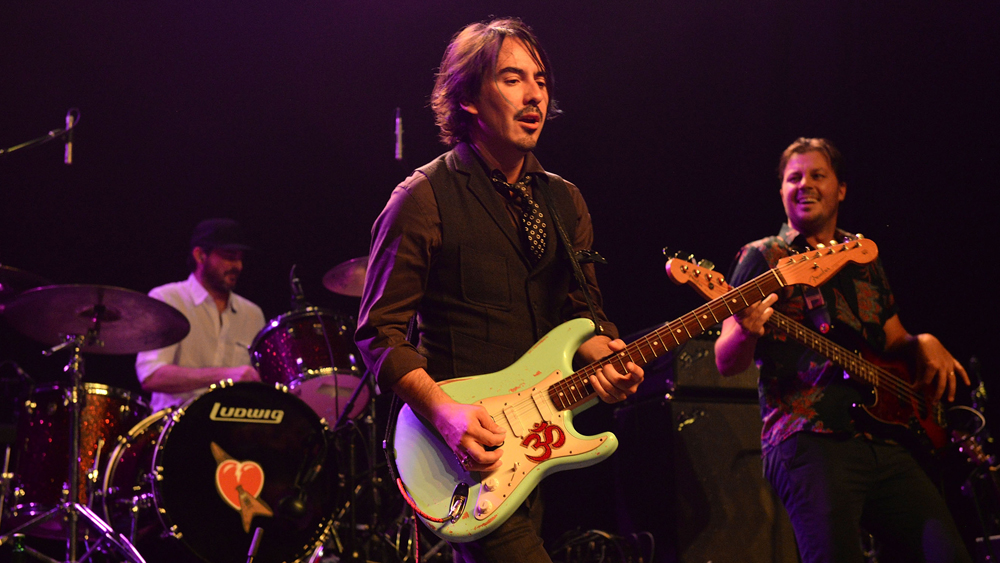
What are your go-to guitars? Because, it’s funny, we acquire all manner of things in our lives but often there is one acoustic guitar and one electric guitar that just resonates in the right way, and there’s a certain amount of kismet in how these instruments find themselves in our possession.
“An Eric Clapton Fender Strat model, but I've customized it to have a dual-coil on the bridge pickup and I use the active Gold Lace Sensors. I like a satin finish neck, stripped. I don't like any varnish, and I'm not really into rosewood fretboards, either. I like the maple neck, and I prefer stains to paint.
“My other go-to is a Gretsch Sparkle Jet. I took the Bigsby off because it never stayed in tune, so I've got that set up with an old pinned Gretsch tail plate. Now that will never go out of tune.”
“I also have a Jazzmaster with a Mastery Bridge. Again, with the original bridge they’re almost unplayable, so I put a Mastery Bridge on it and you can smash those things around. That’s what I played in Fistful of Mercy, but with Thenewno2 and my solo work, [it’s] mostly a Strat.
“More recently, I’ve got into the Charvel with the locking nut and Floyd Rose – a pink one. That’s for anything that’s got the dive bombs. And again, it’s just basically a Strat; it’s just got a different brand on it, and it’s got the Floyd Rose.”
Has your soundtrack work altered your expectations of your own solo material, perhaps in terms of the process – ie, chasing a character down a rabbit-hole, or finding the mood for a scene? I remember reading that you wanted to do a series of imaginary soundtracks. Is that something that will see the light of day at some point?
“I had discussed this idea with JJ Abrams, actually, and we still think that’s a good idea. But I think my last solo album, In///Parallel, was a soundtrack to a movie that never got made. And the album that I’m working on right now – whose name cannot be disclosed – is definitely the soundtrack to my last two years. It’s all about making your own soundtrack to yourself.
“I don’t so much write songs anymore; I write pieces of music, and if they turn into a song, that’s great. But if they don’t, and they just go somewhere and just taper off into something else, that's okay, too. There are no rules.”
There’s something uniquely organic about metal, wood and magnets making sound. There are physical limitations. Synthetic instruments don’t have those. Has being able to play with all different kinds of synthesized textures and sounds changed your perspective of what the guitar can do?
“Yeah. I'm really into customizing and conversions and stuff. I was chatting to Graham Coxon because he was playing a lot on this new record and he has a Manson guitar, which is a company Matt Bellamy is involved with. It’s got kill switches, a Sustainiac, and all kinds of Moog guitar harmonic things. That shit sounds awesome. I'm going to try and get myself one. But I’m not quite into Matt Bellamy’s Kaoss pad guitars. They're a bit heavy.
There's nothing worse than getting on stage and having a guitar that just won't do what you need it to do, no matter how much you love it
“I do play four Kaoss pads and a guitar at the same time live, so I get why he built them into the guitar. If it works, it works. There’s nothing worse than getting on stage and having a guitar that just won’t do what you need it to do, no matter how much you love it.
“I’ve also taken a couple of Jazzmasters and put rail pickups on them, or P-90s and the rail. Sometimes they’re really successful, sometimes they sound like shit. It’s hit and miss. Whatever works. I like trying to have this stuff that no-one else has, just because it sounds like you.”
Do you think that the advance of effects pedals, digital modeling tech and so forth is extending the guitar’s potential to where we re-evaluate what’s possible with guitar?
“Totally. I've got a Moog guitar that I play like a synth pad. I’ve got so many pedals of all different kinds. Most of my distortion pedals just destroy the tone. So that’s my sound – my sound is that it sounds like it’s all messed up. But then if you want to go really wrong, get into all those [Electro-Harmonix] POGs and HOGs, and start making what sounds like B3 organs.
If you've got time and the will to do it, you can make a guitar sound like anything
“A lot of the time I use reverbs to just wash things out, and then depending on how you play you can use EBows and make it sound like it’s a cello. If you've got time and the will to do it, you can make a guitar sound like anything. And for a lot of stuff, like when I’m doing composing, I’ll just use a guitar instead of a synth, and I can write way faster. I just do one take and I can get it. I know exactly how to get the sound that I want.”
Are there any effects that particularly inspire you?
“I really love that new Jack White Plasma pedal. It’s one of the Gamechanger Audio and Third Man Records pedals. That is amazing. There’s also a couple that I don't want to say as I don’t want to give away all my secrets.
“I'm a big Z.Vex fan, and they’ve made me some stuff that had never been made for anyone else. I've got some prototype stuff from them with weird modular ring tones. I like some valve pedals. I have a really nice Bad Cat pedal that’s got two valves in it. That's just a distortion with another gain booster. It’s like having an extra cab head.
“And I'm a big fan of the DigiTech Whammy, too. I've gone through so many of those, but there’s no-one that makes the same one that’s any more robust.”
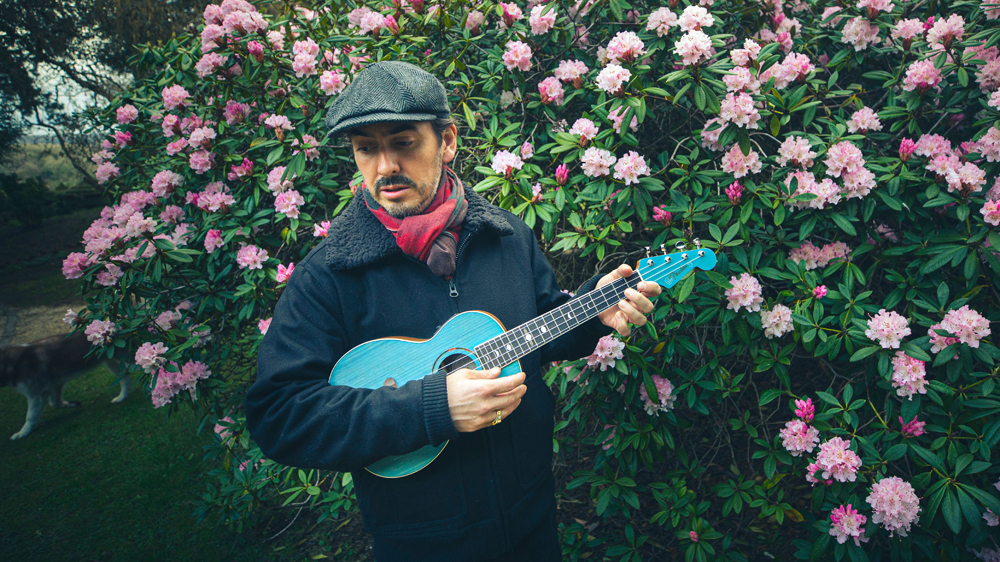
In terms of guitar players, who lit the fire for you and who continues to do it now?
“To start off with, I think the first guitar player I listened to was Buddy Holly. Just A, D, and E, and all those little solos, Words of Love and stuff. That's how I learned, and that’s all downstrokes, basically. Everything he plays is downstrokes. Then, because it’s the same chords, I got really into AC/DC. But when I first heard Cream and Hendrix, it was over. There was nothing else.
Hendrix on guitar, it’s not even a guitar; it’s some extra appendage on his body. You watch him play, it looks like he’s milking a cow
“I also love David Gilmour, and I’m obviously a huge fan of my dad and Jimmy Page. But I’m a big fan of Jimi Hendrix. No one came close… To this day. Hendrix on guitar, it’s not even a guitar; it’s some extra appendage on his body. You watch him play, it looks like he’s milking a cow.
"It doesn’t really look like playing. I think he was a fifth-dimensional being, an ascended master. But I also love Cream, and I was a big fan of Clapton’s earlier stuff.”
Finally, what have you got coming next? What are you working on?
“I just finished the soundtrack to a movie called Futra Days, the second movie from our dear friend Ryan David, and I'm working on a new record. The only people who have played on it, other than me, are Nick Fyffe, from my old Thenewno2 band, and Graham Coxon, who came and played a lot of real mental stuff.
“He was one of my all-time heroes. I grew up playing to him, so our styles work quite well together. He's a lovely, lovely man. It’s been slow because I haven’t had any engineers, and I haven't had any of my community around me because of the COVID pandemonium.
“We had four nights at the O2 sold out with ELO, but that all disappeared. I should've been on a massive European, Scandinavian ELO tour, but it just all went ‘poof!’ in one second. It disappeared in a big puff of hand sanitizer.”
- The Fender Dhani Harrison Signature Ukulele is out now. See Fender for more details.
Jonathan Horsley has been writing about guitars since 2005, playing them since 1990, and regularly contributes to publications including Guitar World, MusicRadar and Total Guitar. He uses Jazz III nylon picks, 10s during the week, 9s at the weekend, and shamefully still struggles with rhythm figure one of Van Halen’s Panama.
